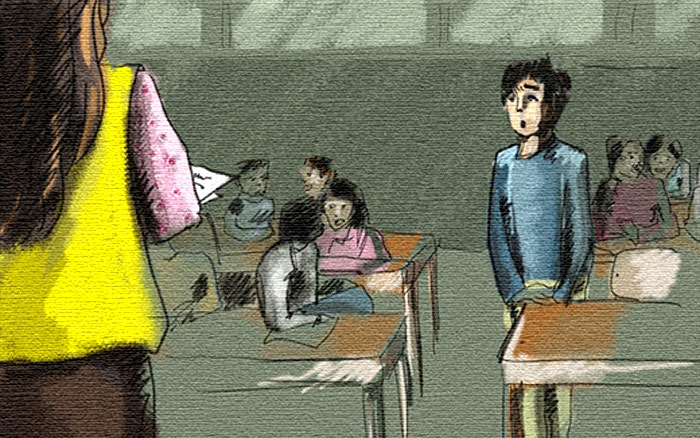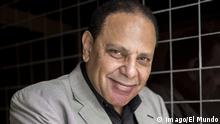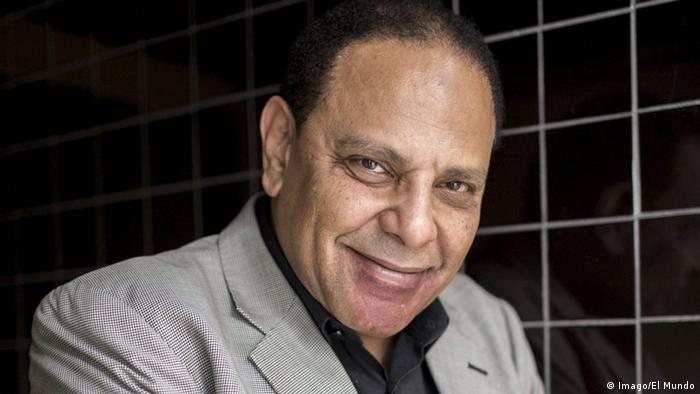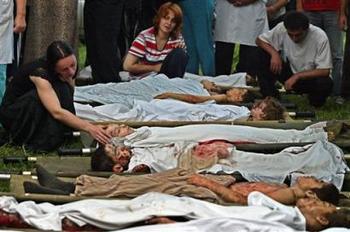This link, now three years old, appeared in my Twitter timeline. I cannot fully understand it but it carries a powerful message, especially in the image and caption. I capture it here for future reference.
My blog gets very little traffic, but if any reader can explain the larger narrative please do so in a comment.
Biography of primary pain
Rustam Mahmoud
25.10.2015
When the teacher entered the classroom on our first day at school, there was a long silence between us. Her eyes were divided right and left and shouted with all her strength suddenly: "Qaim"! One student stood up. Then she returned the ball again: "And you, O Bahim!"
But without any point, as the student was standing just himself. The teacher will need five minutes of staring at the students' names table to find out that the standing student was the only student who understands Arabic among the 40 students.
After many years of that first day, Professor Bogus will impress on his students in English, and then ask the students: Who did not understand the lesson? A Kurdish student raised his hand, which means that Professor Bogus will repeat the whole lesson again. Then he returned the question, and the student himself raised his hand, expressing his lack of understanding. And then Professor Bogus took out all his anger, saying: "You, my son, how do you understand, and you, my son, you are taking the English lesson in Arabic from an Armenian teacher and you are a Kurd, and you, my son, have no right to you or me." Then the students drowned in laughter.
The teacher remained staring at the name sheet, then said: "Ahmed Abdul Qadir."
No one raised his hand, increasing her fury and shouting: "You even know what you know, Min Ahmed Abdul Qadir"?
Valkz asked a student sitting in front of me: "And you, Hamo, teacher calls for your name."
This is Javla. The teacher says to him, "Shaw, your name?"
The teacher smiles and follows: Michelle Gerges, Micho Gergesco. Called: "Khalil Hussein," Vlkz free Hasko. "Hanna Korean", Vlkz Hanoushi.
A few days later, a teacher like us will forget the names written on the official school paper, and will call us our names, which we love, so to the fifth grade.
***
The students were sitting normally until the third grade. On the second or third day of that year, a man with a beard and a beard entered a veiled school we saw for the first time. Then he began repeating the names of the students: "Hanna, Barzoum, Philip, Charbel, Hikmet, Ankidu, Shimon ...". Then we will know that these students are Christians, and they will attend the religion lesson in their own room. They will sit together in a corner of the classroom, and we will sit in the other part of it. We will split during the sports classes for two teams, and Philip will not come to accompany me to school. He will go with a stomp, and I will go with Aliko the cunt. We will hunt each other in the narrow canoes. Abu Barzoum will die in a traffic accident, and the bearded man will take the students whom we first visited and cherish. When the people of Radwan al-Samin will enter their second room, only those who did not go to visit Barzum will help him on the day of his father's death. Until the day comes and ask the teacher of religion: |
| "Professor, will Christians enter paradise?" He responds without hesitation: "Whoever is not a Muslim will remain immortal in the fire of Hell." |
Many years later, when I asked them to leave the country, I would miss the tears of my friend, a Korean owner, as I missed my mother's tears. But between the two moments of the professor and nostalgia for the friend Malik, misery in the soul is painful, and the plight of untold transgression.
***
A year earlier, the teacher had asked us to bring with us the next day ten liras. She gave us a small piece of paper to hand over to our parents. We did not know what was written in that paper, we were still in our second year of our knowledge of Arabic. In the morning, my mother told me that the teacher was asking ten liras for a donation. My mother drew the money in a paper and inserted it tightly into the soles of my pocket. On the way to school, I decided not to give the ten lira to the teacher, to pretend to forget the paper in the bag, and not to inform my family about it, so I could buy the extra pieces of biscuits when I returned home.In the first lesson, the teacher asked all students to put the money and paper on the table. I only put paper. Then the teacher took dozens of pictures out of her bag and put them on the big board in the row. They were pictures of people being fed up under shabby tents. Photos of homeless children. Large destroyed buildings and mothers receiving treatment in hospitals. "There was a terrible earthquake in Armenia two days ago, in which dozens of people were killed and wounded, the earthquake destroyed many neighborhoods of Yerevan and thousands of people were sleeping in the open. Your donations will go to the wounded children of Yerevan ..." Armenian people.
Then she took the ten lira out of the bag and placed it silently on the paper. Exactly then, when I saw the tears of the Armenian teacher, I realized that crying was not really a Kurdish act. In the same year, the tears of mothers, sisters, aunts and neighbors were drowned in the funeral of the Husseinite weeping of the spring of 1988. They were crying the Halabja children, who were also slaughtered in the open.
***
As we received history and geography books in the fifth grade, the great questions were beginning to penetrate our minds. I do not know exactly if this is a year, but it was exactly what was going on in my self. History books were beginning to recount the history of Arab tribes that migrated from Arabia when the Marib Dam [Note below] collapsed and how these tribes spread throughout the Arab World. All ethnic and linguistic origins in the various regions of the "Arab homeland" return to the migratory tribes of the island .Mr. Ahmed explained it to us and the sweat was beating from his forehead. Wipe his glasses between the moment and the other. He said reluctantly:
"The Arab people live throughout the Arab world, from the Far of the Arab Maghreb to the Far East in Syria and Iraq, and Turkey occupies many Arab regions, from the Iskenderun Brigade to the borders of the Arab state of Diyarbakir."
I was surprised to hear this explanation: Mr. Ahmed was a free and loyal friend of the PKK.
"When we liberate our land occupied by Iraq, Turkey, Iran, and Syria, we will return Diyarbakir as the capital of the Greater Kurdistan," he said. "These Turks and Arabs occupied our land, and we have to go back. Arab and Turkish and Persian lie lies! Is the land of Kurdistan only ... ".
Years passed, and I did not have the courage to ask the teacher: What liars are true, and which lie? Later, too, we discovered that both could be a lie, and that both would be true.
***
In the second half of elementary school, our childhood was witness to major events. Exactly two years ago, the Iraqi army had occupied Kuwait, and months later the war against its regime began. During that particular war, the Kurdish revolution took place in the modern era. Large areas of Kurdish areas have emerged from the control of the Iraqi army, and millions of Kurds have fled to the mountains to escape the chemical bombardment they feared. These events did not happen naturally in our small society and primary school. All the parents and neighbors around us were watching the television screen eagerly in the evening and rushing to collect donations and food for displaced Iraqi Kurds, where thousands of them in their traditional clothes were among us.In those years, we felt our first sense of the worlds of identity, meaning and the other. "Hani told the arrows that they love Saddam Hussein," whispered Amadou. "We boycotted him and did not play with him on the same day. We talk about our people who were preparing the doors to close tightly. And Rula Shakra says to our irritation: "Papa says that if Saddam had gone to Hun, he would hit the Kurds only." The war took months. All the children shared the pain when their fleeing homes hosted the war, but none of the school's children told a story about another boy. Everyone felt that he alone was suffering.
***
As the people of the villages feared cars and high buildings in the cities, we were afraid of the mass building of the high school in the middle of the neighborhood. A brownish block, deaf, amid the huts of our sloping mud houses. It stood between the Kurdish, Armenian and Syriac lanes in the far west of the city. On its facade was a huge picture of Persia and its imagination written under them, in parentheses, "Hatem al-Taei Arab elementary school."In that building we discovered questions, meanings, identities, regularity, corporate spirit and competition. In that building we discovered the richness of the social world for our surrounding environment. On the same line we taste the first taste of oppression. Conquer first seeks to heal, where the long marches that we come out as students of the first acts of tiring. Every year we go out in dozens of marches that roam the entire city, for many "national" and "national" events. At one of the marches we took out, which was hard to forget, the third grade teacher prepared us for the walk when I asked the students if someone had a big picture in the house to carry on the march. Mohammad Ali raised his hand and said, "We have a big picture on the house." The teacher asked him to come with her quickly. Mohammed Ali Mahroula jumped. A few minutes later he returned holding a stenciled man with two thick Kurdish knees, saying: "Hey, my grandfather's picture followed the saloon, and in the picture of my father and my mother in the bedroom as well." The teacher exploded in his face, saying: "And I am uncle saying a picture of the master, and you Rahib Jaibli picture of your grandfather!" The teacher swore that she would lift him up when we came back from the march. Then it was our long story with the images that filled our lives against us.
***
But in the world of semantics, there were two things in our school that we only discovered later: at that time our educational institution was not as corrupt and corrupt as it was later. Our classes were always clean, and the school was very accurate. The heating was complete throughout winter days, as were books and educational materials. There was great fairness in the distribution of state power in that sector. All the children of the city, regardless of their situation and circumstances, found in this building a suitable place to open their talents and abilities. It is said that in the mind of all the sagging, disintegration and corruption that hit the educational institution in later times, it transformed from an educational development environment that establishes a relative social justice, to a focus of business and the adaptation of civil society through allocation.The primary school, because of the ignorance of many teachers and the lack of follow-up parents, was a confined space for harassment. Memory is full of images of the practice of some teachers towards students, especially those with lower levels. They put the pens between their fingers and enjoyed their dreams. They asked them to stand at the end of the row and raise their hands. Some of the most violent teachers were violently removing the hair from their heads. The school principal, for whatever reason, was pushing the students around their senses.
Our manager owns a shop right now downtown. After the revolution began months, I stood in front of him in the shop and asked him if he knew me? He replied no. I said to him: "You are very much sadistic of Soualfi, you are the first person to offer me pain and violence, but if I do not want a revolution, you will become a revolution of revenge.
~~~~~~~~~~
The Marib Dam in Yemen dates back to about the 8th century BC and is considered the oldest known dam in the world, being counted as one of the most wonderful feats of engineering in the ancient world.



